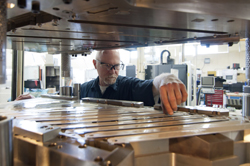Eco-friendly machine tool manufacture
The European machine tool industry is dominated by small- and medium-sized enterprises. They are seeking a solution to the long lead-times, substantial raw material usage and high energy consumption that is impinging on their competitiveness. An innovative EU-funded project set out to develop lightweight and adaptive machining structures to maximize productivity while minimizing environmental impact.Through work on DEMAT project, scientists developed a holistic solution consisting of design tools, process simulations, novel machine concepts and associated services and business ideas. The solution promises to reduce steel usage by 1.5 million tonnes and carbon dioxide emissions by 2.5 million tonnes annually.Conventional machine tools deliver high accuracy, reliability and productivity through the use of heavy and stiff structures. This requires intensive use of natural resources including materials and energy. DEMAT proposed a revolutionary approach that reduced the mass of both passive and active skeletal building blocks by over 50%. In addition, the structural building blocks are 100% reusable in machine modules of other machines with high accuracy and reliability. The modular concept is predicted to reduce the lead-time of new machines by 60%.A process planning generator tool uses real-time monitoring of various parameters to optimise process transparency. The use of multiple input – multiple output control strategies enables real-time adaptation to reduce vibration and enhance reliability of machining. A 'Holistic Production Planner' continuously monitors relevant production parameters to optimise decision-making related to processing, energy, productivity, reliability and more. DEMAT has also delivered a 'Business Model Assessment' software to integrate technology into new business models where flexible groups of companies share risks, benefits and costs.The good news has been shared through a variety of channels including scientific publications and a strong presence at conferences and trade fairs. Having conducted a market analysis and taken into account potential standardisation and regulatory issues, the technology is ready to move quickly toward commercialisation.
Keywords
Machine tool industry, machine modules, mass, lead-time, process planning, real-time adaptation, Business Model

